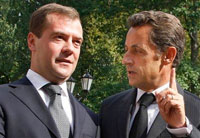French president arrives in Moscow for painful talks
French President Nicolas Sarkozy began the difficult mission on Monday of trying to persuade Russia to honor its pledge to withdraw troops from Georgia.

During the talks with Russian President Dmitry Medvedev, Sarkozy's European Union delegation also was pushing for a quick deployment of several hundred EU monitors to Georgia. But just after Sarkozy arrived Monday morning, a Russian Foreign Ministry spokesman said Moscow is against an independent EU monitoring mission in Georgia.
Speaking at the start of his talks with Medvedev, Sarkozy warned the Russian leader that the EU is "united" in its stance, adding that "we will defend our convictions forcefully."
"We want peace, we want confidence, we want good-neighborly relations," said Sarkozy, whose country holds the EU presidency.
Nearly a month after a truce negotiated by Sarkozy ended a five-day war between Russia and Georgia, Russian troops remain entrenched deep inside Georgian territory. Georgia and the West have accused Russia of failing to honor its pledge to withdraw its troops to positions held before the fighting broke out Aug. 7.
But Russia says those troops are peacekeepers and that they are allowed under the accord to help maintain security around Georgia's breakaway provinces of Abkhazia and South Ossetia. Moscow has recognized the two regions as independent states.
Sarkozy has been criticized for giving the Russians too much room for interpretation in the peace deal signed Aug. 12, and his diplomatic blitz to Moscow and Tbilisi on Monday may be his last chance to save it - and save his own credibility as a peacemaker.
Other members of the EU delegation are European Commission President Jose Manuel Barroso and EU foreign policy chief Javier Solana.
EU officials said quick deployment of several hundred EU monitors to Georgia would remove any justification for the continued presence of Russian troops outside the two provinces. But their mandate is yet to be negotiated.
Russian Foreign Ministry spokesman Andrei Nesterenko said just before the EU delegation sat down for talks with Medvedev that Moscow was against an autonomous EU monitoring mission in Georgia.
"We believe it will lead to an unnecessary fragmentation of international monitoring efforts already being conducted today by the U.N. and the OSCE," Nesterenko said at a briefing.
Nesterenko said Russia has welcomed the recent decision to increase the number of the Organization for Security and Cooperation's monitors in Georgia. His statement appeared to reflect Russia's hope of influencing the U.N. and the OSCE teams by using Moscow's membership in both organizations.
In his 16 months in office, Sarkozy's doggedness has paid off in the international arena.
He helped win the release of six Bulgarian medics held in Libya; he has strengthened France's diplomatic and military role in Afghanistan; and he has restored France's ties with Syria, among other things.
But he faces a tough job in persuading Medvedev to back down. Moscow has argued that the peace deal allows its soldiers to maintain patrols in a so-called security zone of up to 4 miles (7 kilometers) that it carved out on Georgian territory, and Russian officials have indicated they have no intention of pulling the "peacekeepers" out.
Georgia said Monday that far from withdrawing, Russia reinforced its positions on the outskirts of the Georgian Black Sea port city of Poti over the weekend.
Five armored personnel carriers and about 50 troops were added to a post near the port and one APC and 10 troops were added to a post on a main road into the city, a government statement said. Georgian officials had said previously that there was a total of about 100 Russian troops at the two posts.
Georgia also said that two Russian air force jets illegally entered Georgian airspace Sunday and remained over Georgia for about 45 minutes.
At a Russian checkpoint in Karaleti outside South Ossetia, Tamazi Kaidarashvili, an ethnic Georgian who is one of only a few dozen people remaining in his village north of the checkpoint, said he hoped the EU would persuade Russia to withdraw forces.
"As long as the Russian boot is in the Caucasus, there will never be peace," he said.
Russian tanks and troops entered South Ossetia after Georgian forces began an offensive to gain control of the pro-Russian territory, which has had de-facto independence for more than 15 years. The Russians quickly repelled the soldiers and drove further into Georgia.
Subscribe to Pravda.Ru Telegram channel, Facebook, RSS!


